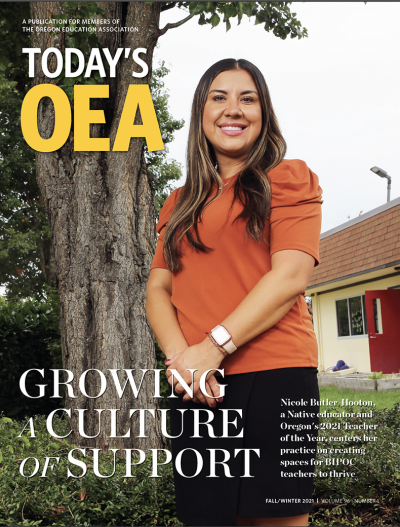For a decade, Oregon has hosted annual legislative sessions, with the long, five-month sessions in odd-numbered years and short, five-week sessions in even years.
Designed for minor updating of budgets and policy, the short sessions are not typically the time lawmakers pursue large initiatives.
Each legislator may introduce just two bills, initial language for which is due by November 19. Committees, presiding officers, the Governor, and the Chief Justice of the Supreme Court are also given a bill allotment.
In all, there will be fewer than 300 bills introduced in February 2022 — a tenth of what a long session typically yields. Most bills will focus on urgent priorities, statutory tweaks and budget adjustments midway through the biennium.
Your Government Relations team is planning to make every minute of this short session count for public education.
Highlights of the bills we will be pursuing include:
- Tax Equity: This bill would add a question about a personal income taxpayer’s race/ethnicity. Gathering this data will enable researchers to gauge the impacts of tax policy on our BIPOC taxpayers but could not be used for tax-payment purposes.
- Improved K-12 Funding: The association will continue to press for a fix to the method of calculating a no-cuts K-12 budget for future years, whether through legislative or executive action. We will also pursue K-12’s claim to its corporate kicker receipts, guaranteed constitutionally as “additional” money for the State School Fund operations budget.
- Fire Funds: Rep. Pam Marsh (D-Ashland) will reintroduce a bill supported by OEA to ensure that school districts impacted by the 2020 wildfires are guaranteed stable funding for four more years.
- Respect: A key push in February will be to secure hazard pay for essential frontline education workers.
- Fewer Tests: The association will continue its work to reduce reliance on standardized tests. Our efforts will include a request that school districts undergo assessment audits with the goal of reducing the testing footprint for students.
- Funding Premiums: In 2021, OEA celebrated its success in establishing health-care coverage for part-time faculty in post-secondary institutions. Under that new law, 10% of the cost would be borne by the covered employee. In 2022, we will seek additional resources for staff who opt into this program but cannot afford the premium co-pay.
- Immigration: Also left on the table in 2021 was a bill to ensure universal legal representation for those facing immigration hearings. It is a truism that whether a person is deported or allowed to stay is entirely a matter of representation in immigration court. Our students whose family members are in this situation will be stabilized with this support.
- Fair Compensation: As a member of the Fair Shot Coalition, our team will ask the legislature to include farm workers in the law to compensate overtime work — an exception to the requirement left them out in prior legislative sessions.
As always, elevating member voices in this virtual-only session will be crucial to our success. Let your team know if you’d like to help us get these concepts across the finish line by emailing gr@oregoned.org.

